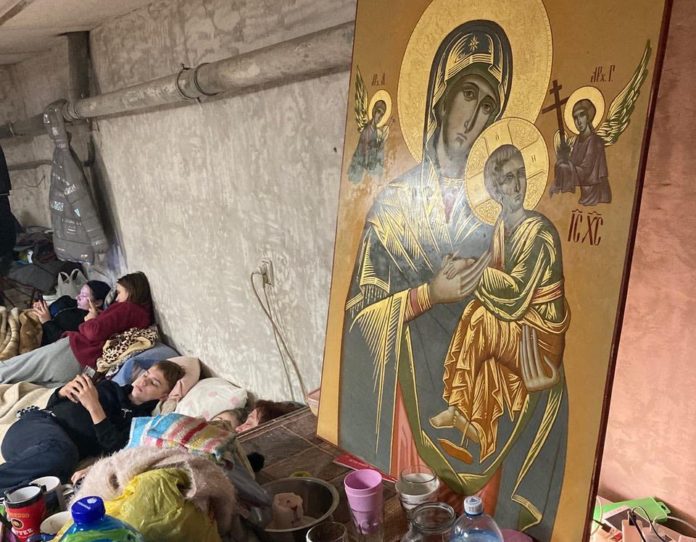A year of war in the heart of Europe
(24 February 2022 – 2023)
(from the Alphonsian Academy blog)
Solidarity is considered one of the principles of the Social Doctrine of the Church[1]. Still, above all, it is a structuring element of the proposal of an integral and supportive humanism, since the Church is aware that its vocation is to walk together with all of humanity along the path of history. The Church becomes solidary already from this primordial attitude, from which it wants to encourage and stimulate said humanism. A humanism capable of animating a new social, economic and political order, based on the dignity and freedom of every human person, to be realised in peace, justice and solidarity.
Solidarity, as a principle and as a virtue, impels the Christian conscience to welcome with evangelical diligence the victims of all tragedies and violence, and at the same time, demands the exercise of evangelical prophecy to unmask and denounce all the evils that provoke them (cf. Brothers All, nos. 114-117).
In this sense, in the face of the war in Ukraine, it is our duty to express our full solidarity with the suffering Ukrainian people. At the same time, in solidarity with all the people who do not want war, neither as an end nor as a means, we must say loudly and vehemently: NO to war, stop this invasion now! Accordingly, only fair measures that are taken for the final cessation of this conflict must be supported.
The prophetic spirit of the Christian perspective leads us not to be naive, assuming the complexity of reality and the multiple scenarios that occur within the conflict. This leads us to think that, even while declaring the aberration of this invasion, the multiplicity of phenomena and responsibilities that led to this scenario cannot be overlooked.
This war reveals, once again, where the desire for power for power’s sake and the logic of confrontation and systematic revenge can lead. But, at the same time, it manifests the inability of a socio-political world disarmed of moral authority – the only one that is capable of cultivating and defending peace by peaceful means -, because its hands are also dirty, to be entangled in those same logics, although the intentions may be different.
Significant are the many manifestations of affective and effective solidarity in the face of this war. Which, on the one hand, cheers and stimulates, perhaps announcing that global consciousness is changing and taking on more courage to claim a different present and future. On the other hand, it is striking that in the face of so many other acts of violence and war in our world, we do not always see the same solidarity and prophetic force. This indicates that not everything is quite right, nor as clear as it seems.
The language of violence and revenge is imposed, once again, by the perpetrators and not a few flatterers and associates of this logic. At the same time, a language of peace and solidarity with the victims, expressing the desire for a world at peace, is forcefully noted. We need, without a doubt, to cultivate and make evident, in its declamation and concrete consequences, the language of non-violence and global peace, to strive for a plural and symphonic world, where conflicts are always taken up in a global and peaceful manner. We need more prophetic solidarity and less naive and/or malicious complicity. In this sense, we must strongly proclaim: NO to weapons, YES to all kinds of disarmament![2] And to say with Pope Francis: ‘What matters is to initiate processes of encounter, processes that can build a people capable of embracing differences. Let us arm our children with the weapons of dialogue! Let us teach them the good fight of encounter!” (FT, no. 217).
We hope that there are many people who can associate themselves with the voice and determination of Pope Francis, as he has manifested since the beginning of this conflict and throughout much of his service as pastor and teacher; so let his words be a corollary to this poor manifesto of ours. In Brothers All, in the context in which he speaks of the rights of peoples and the need to understand relations between them in another way, he states that:
Without a doubt, this is another logic. If one makes no effort to enter into this logic, my words will sound like a fantasy. But if one accepts the great principle of the rights that come from the mere fact of possessing inalienable human dignity, it is possible to accept the challenge of dreaming and thinking of another humanity. It is possible to desire a planet that provides land, housing and work for all. This is the true path to peace, and not the foolish and short-sighted strategy of sowing fear and distrust of external threats. Because real and lasting peace is only possible starting from a global ethic of solidarity and cooperation at the service of a future shaped by interdependence and co-responsibility in the whole human family (n. 127).
Fr. Antonio Gerardo Fidalgo, CSsR
(Original text is in Spanish)
[1] Cf. Pontifical Council for Justice and Peace, Compendium of the Social Doctrine of the Church, LEV, Vatican City 2004: “An Integral and Solidary Humanism” (nos. 1-19); “The Principle of Solidarity” (nos. 192-196); “Solidarity among Workers” (nos. 305-309).
[2] The Pope has repeatedly expressed his views on arms and disarmament; for example, among many, see: Evangelii gaudium (2013), no. 60; Brothers All (2020): nos. 29; 38; 188; 258; 260; 262; Address on Nuclear Weapons, Nagasaki – Japan (24.11.2019); Message addressed to the 4th Paris Peace Forum (30-10-2021) (scheduled from 11-13.11.2021); Message on the occasion of the first meeting of States Parties to the Treaty on the Prohibition of Nuclear Weapons (21.06.2022); Address to members of the diplomatic corps accredited to the Holy See for the presentation of New Year’s greetings (09.01.2023).






